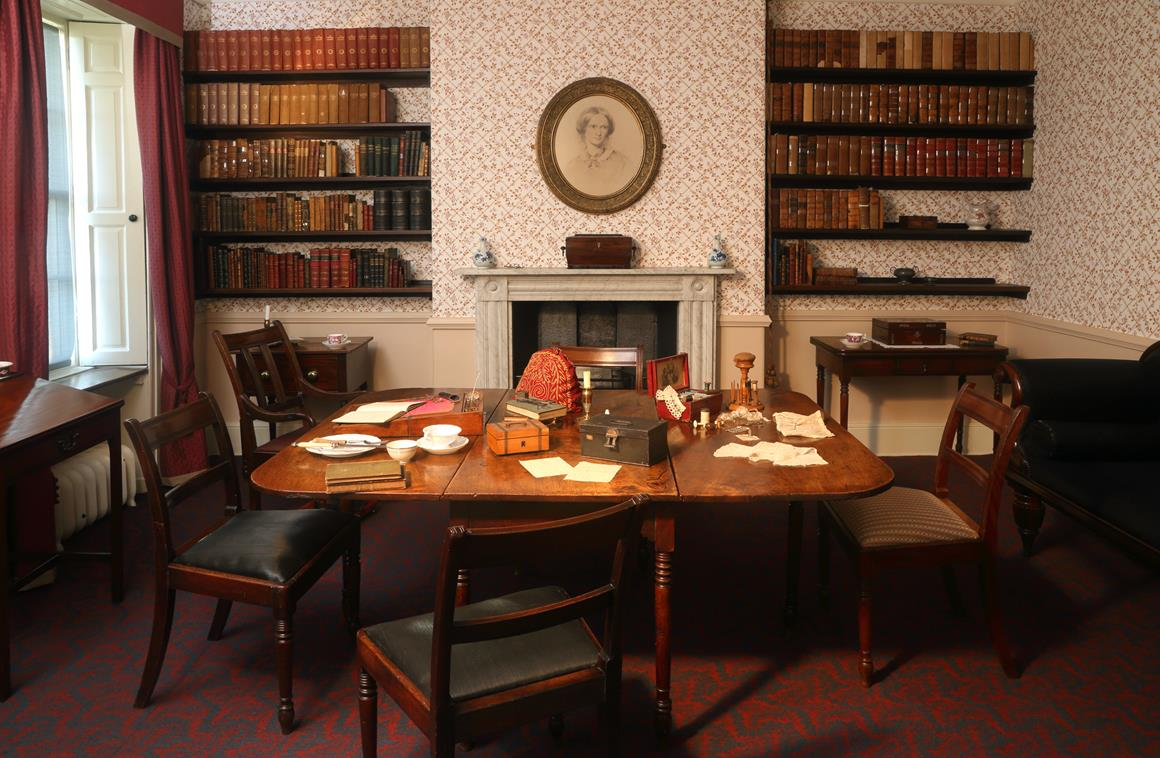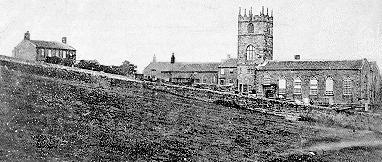I received this nice reaction from Anne.
She is an artist and keeps an interesting weblog.
I post it here because her reaction is interesting and I love when people share with me their love of the Bronte Sisters!
"" I love the story of Charlotte's and Mr. Nicholls courtship. It's good to see this fine man finally get his due in these last years.
It's no small thing to have won the hand of a Brontë, make her very happy and then protect her legacy for 50 years. Mr. Nicholls created the first Brontë museum in his home after leaving Haworth.
I also love reading about the 3 times Mr. Nicholls is so overwhelmed by his love for Charlotte, he simply breaks down.
Of course when he purposed,then the last church service, at Whitsum, ( when the congregation saw his struggle and cried )and when he left the school deeds at the parsonage before leaving Haworth, believing he would not see CB again. As we know, she came out and found him sobbing at the gate.
Nicholls was too in love to give up just because those at the parsonage told him to. He persisted and won his prize
It must of been amazing for Charlotte to see in another a love that was so like the love she felt for Constantin Heger. To relive that huge event in her life, but from another perspective entirely.... this time she walked in Heger's shoes.
This had to help Nicholls's cause. Because Charlotte knew so well the pain of unanswered letters, she could not afflict it on another forever...and indeed that was how Arthur started to win her, when she finally answered his letters.
Few people were as keen an obverser of human nature than Charlotte Bronte. So it says a great deal about Arthur that the more she got to know him, the better she liked him, until esteem turned to love.
Her awful loneliness now that the London years were winding down and also the pressing need to somehow replace her father's work while he retained his position also helped Nicolls's cause as he was the answer. But how lovely real happiness came to Charlotte as well.
Charlotte's need for such happiness was such, that if even she knew what was ahead, I can't say she would not have gone forward with the marriage anyway.
We know Nicholls never fully recovered from her loss and his grief remained raw. And I think he too would have said that the few months of his happiness with Charlotte as his wife was worth the subsequent 50 years of grief. This is a great love story and deserves its place in Brontë history""
She is an artist and keeps an interesting weblog.
I post it here because her reaction is interesting and I love when people share with me their love of the Bronte Sisters!
"" I love the story of Charlotte's and Mr. Nicholls courtship. It's good to see this fine man finally get his due in these last years.
It's no small thing to have won the hand of a Brontë, make her very happy and then protect her legacy for 50 years. Mr. Nicholls created the first Brontë museum in his home after leaving Haworth.
I also love reading about the 3 times Mr. Nicholls is so overwhelmed by his love for Charlotte, he simply breaks down.
Of course when he purposed,then the last church service, at Whitsum, ( when the congregation saw his struggle and cried )and when he left the school deeds at the parsonage before leaving Haworth, believing he would not see CB again. As we know, she came out and found him sobbing at the gate.
Nicholls was too in love to give up just because those at the parsonage told him to. He persisted and won his prize
It must of been amazing for Charlotte to see in another a love that was so like the love she felt for Constantin Heger. To relive that huge event in her life, but from another perspective entirely.... this time she walked in Heger's shoes.
This had to help Nicholls's cause. Because Charlotte knew so well the pain of unanswered letters, she could not afflict it on another forever...and indeed that was how Arthur started to win her, when she finally answered his letters.
Few people were as keen an obverser of human nature than Charlotte Bronte. So it says a great deal about Arthur that the more she got to know him, the better she liked him, until esteem turned to love.
Her awful loneliness now that the London years were winding down and also the pressing need to somehow replace her father's work while he retained his position also helped Nicolls's cause as he was the answer. But how lovely real happiness came to Charlotte as well.
Charlotte's need for such happiness was such, that if even she knew what was ahead, I can't say she would not have gone forward with the marriage anyway.
We know Nicholls never fully recovered from her loss and his grief remained raw. And I think he too would have said that the few months of his happiness with Charlotte as his wife was worth the subsequent 50 years of grief. This is a great love story and deserves its place in Brontë history""



How nice to see my comment as a post! Thank you. You have a wonderful blog here. Your love and dedication to the Brontës is remarkable and touching.
BeantwoordenVerwijderenIndeed I'll be painting a portait pair of Charlotte and Arthur in the future( with video!) and I'm looking forward to it.
I was just reading how even late in life when Mr. Nicholls and his 2nd wife, had younger family members visiting, if they happen to be reading Charlotte's books,they had to quickly hide them when Arthur came into the room. Because even this slight reminder so many years later would be hurtful to him.
50 years after Charlotte's passing , Arthur spent his own last days eagerly awaiting seeing her again.
This kind of love is extraordinary.It sweeps away one's mere ideas about oneself. That fog of ego based ideas of who we are that we mostly live in and believe to be our selves...unless an event like Arthur's love for Charlotte happens to us.
One cannot forget such a love because it's a state of being. It's a doorway to one's authentic self.
But most likely nothing less than such a love would have moved Charlotte to final accept Arthur Bell Nicholls.
Whatever Arthur's intellectual limitations were next to Charlotte's, he was her match emotionally and that was the more rare and important of the two to her.